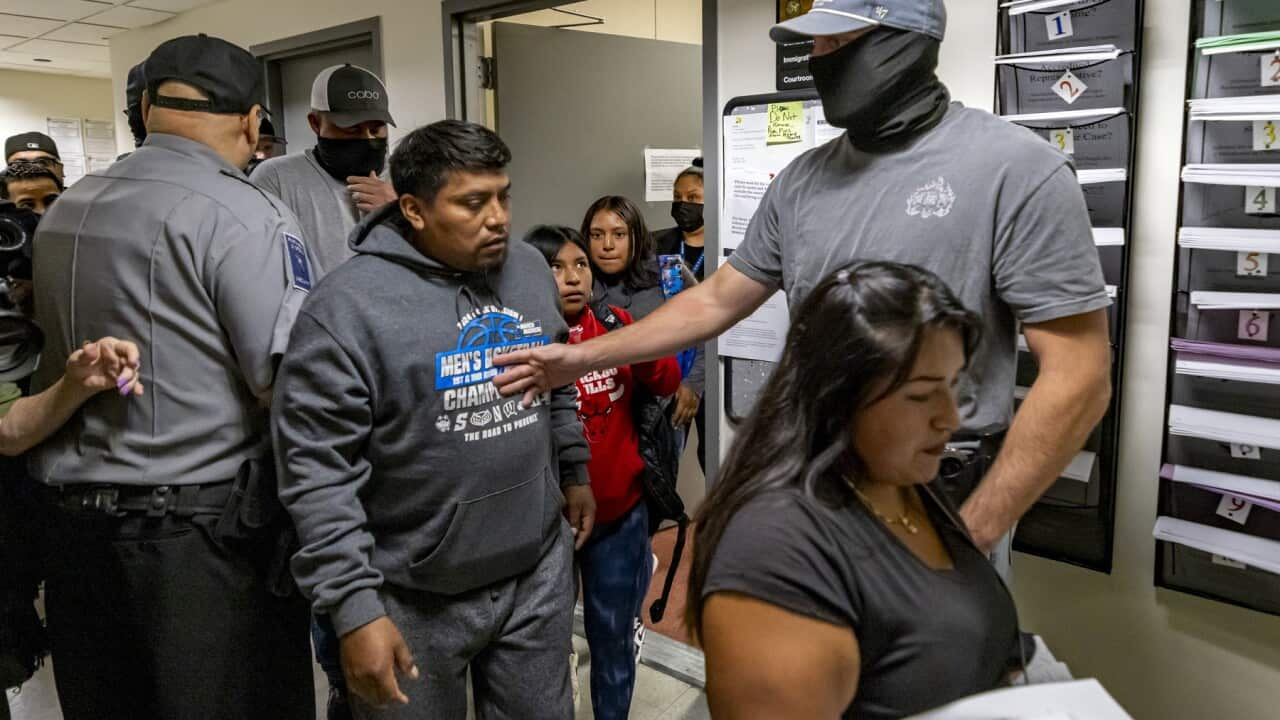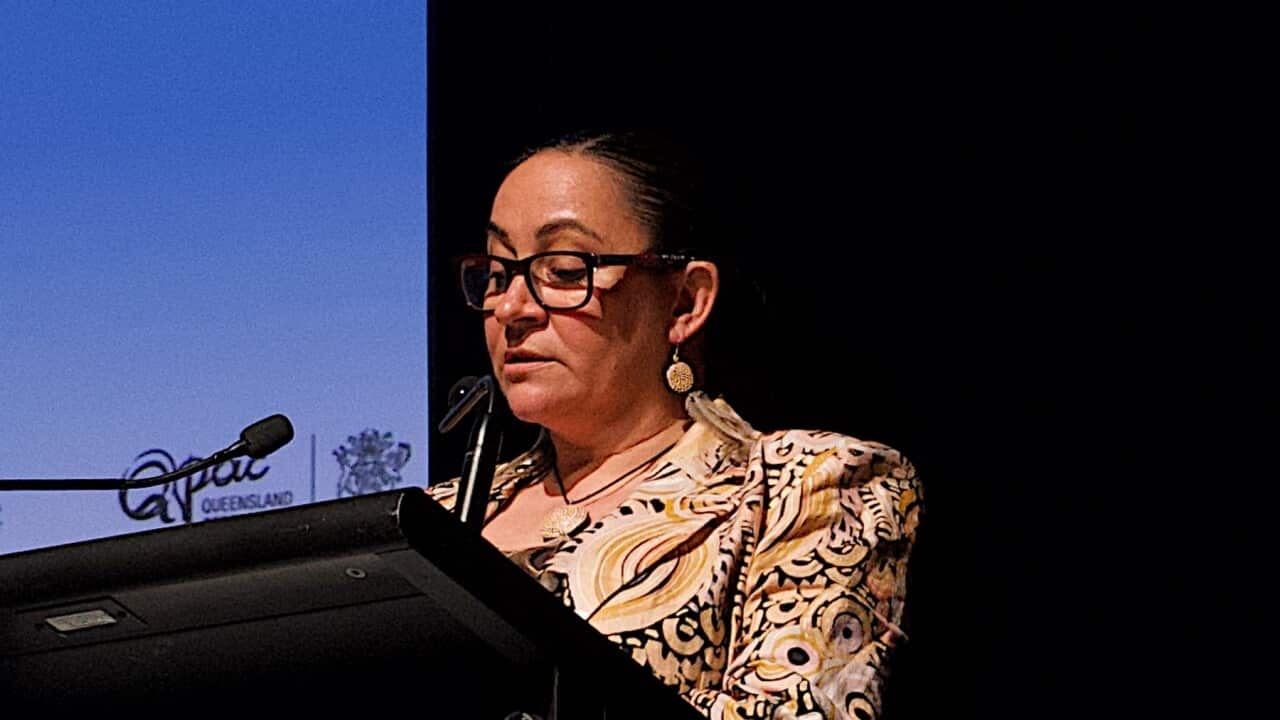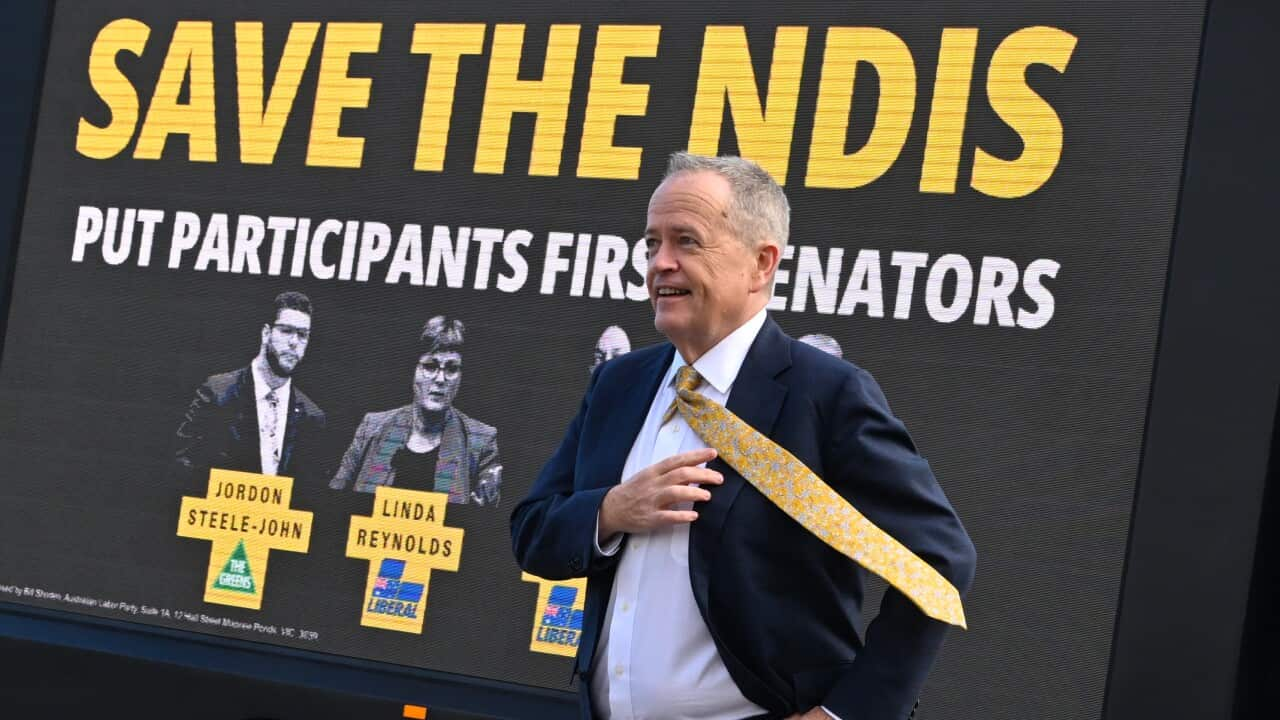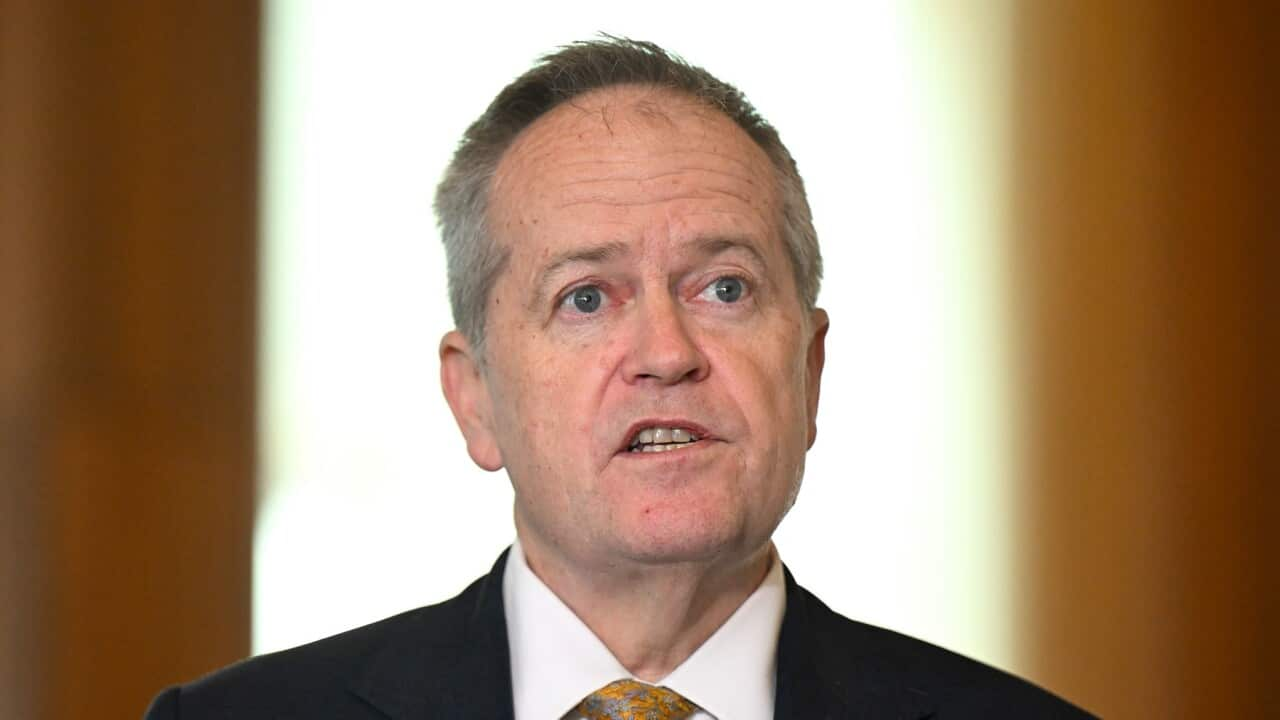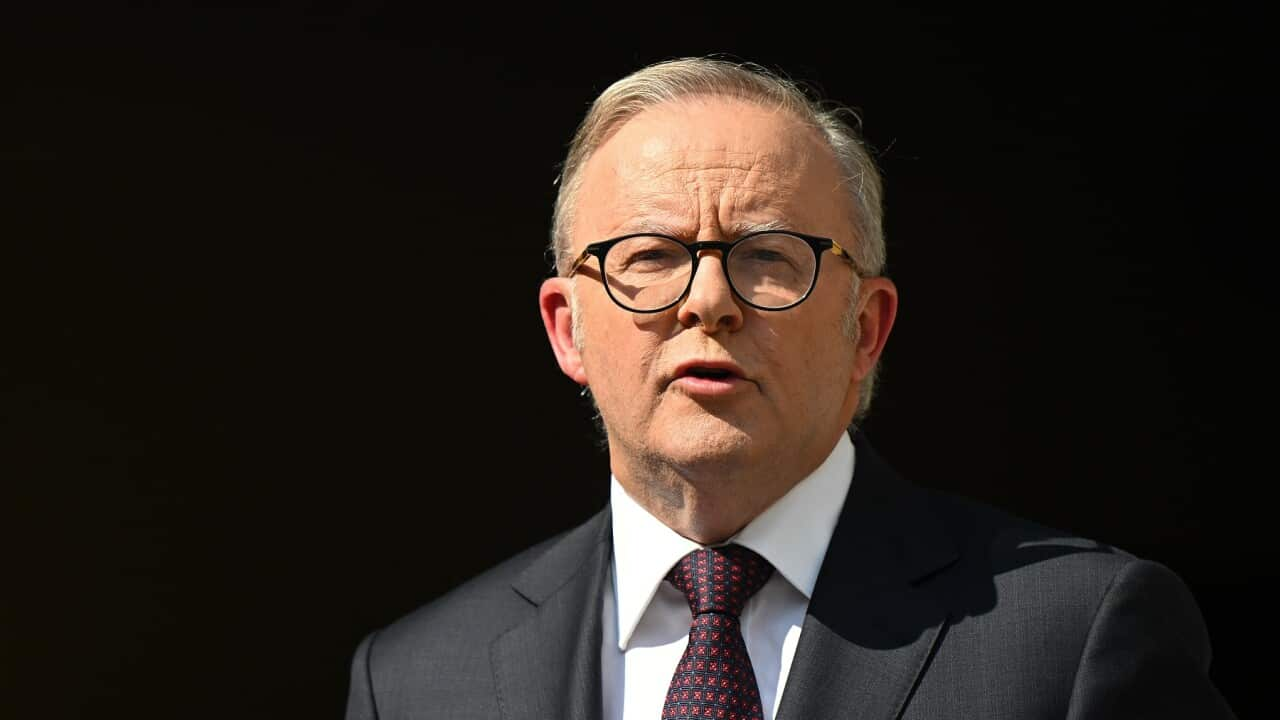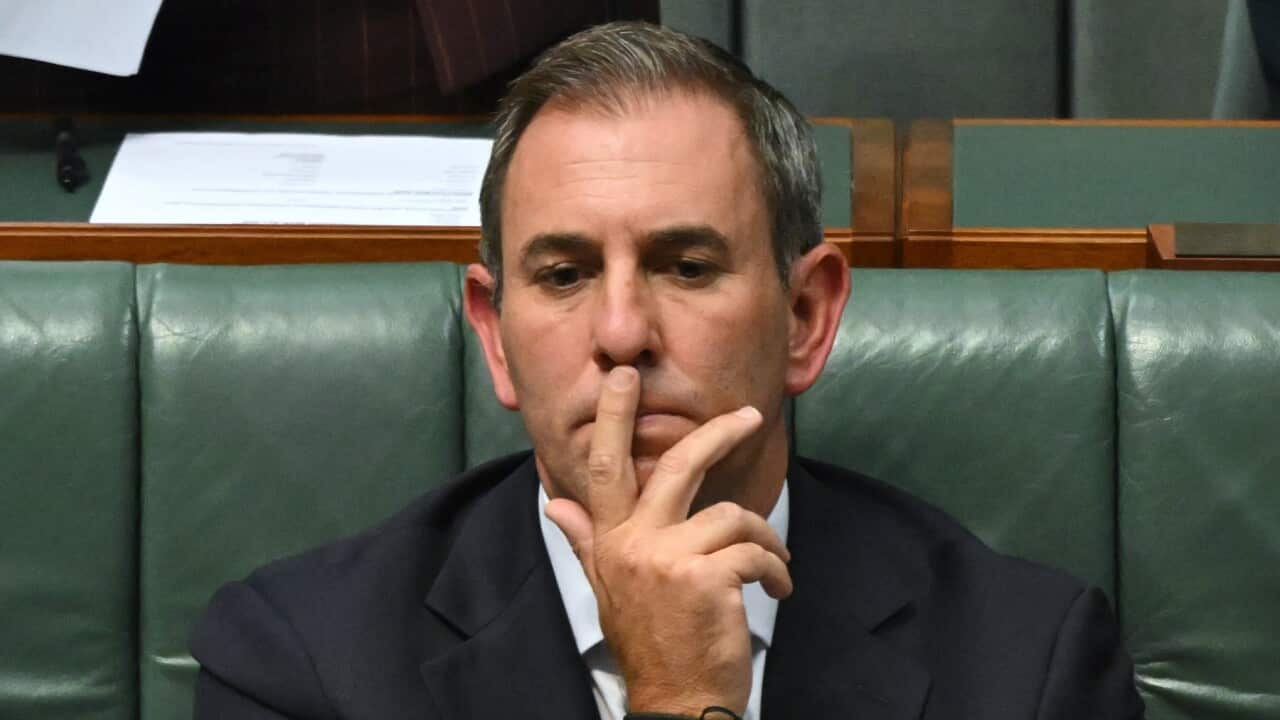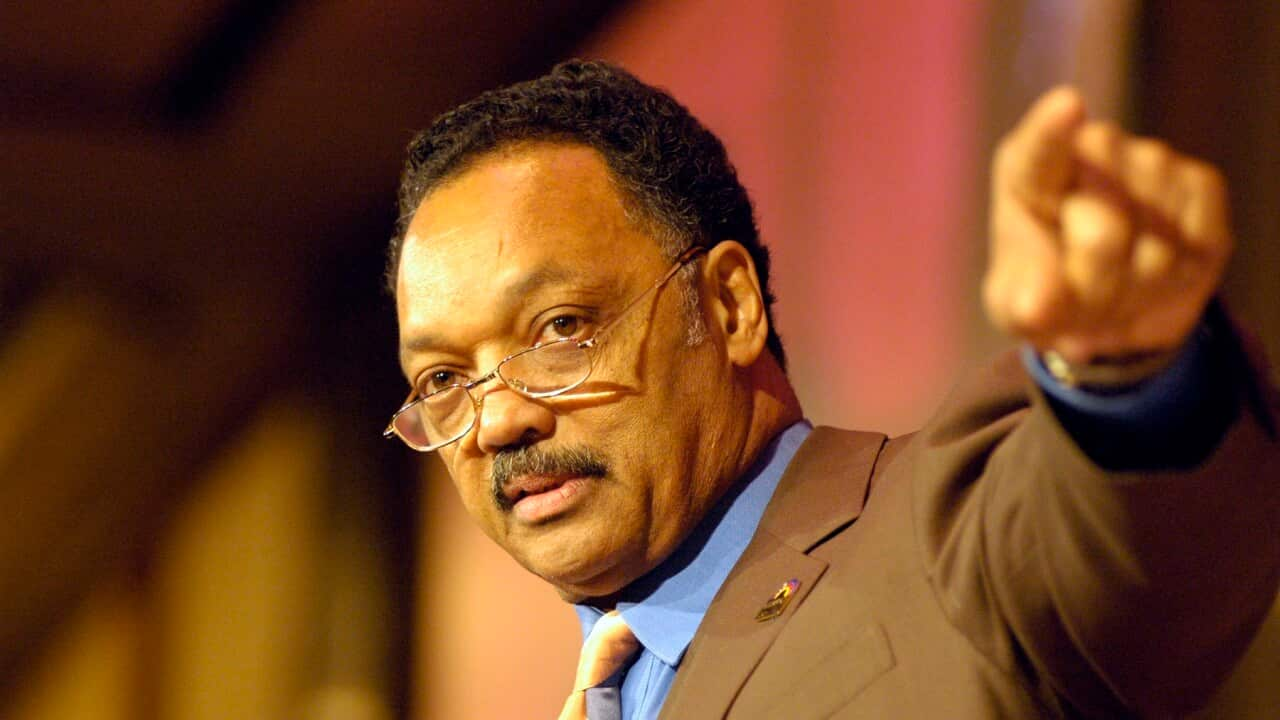Listen to Australian and world news, and follow trending topics with SBS News Podcasts.
TRANSCRIPT
“From day one I will seal the borders, stop the invasion, and send Joe Biden's illegal aliens the hell back home.”
That's Donald Trump, speaking in the lead-up to the 2024 US election as part of a campaign characterised by regular rhetoric on immigration.
Since Trump's return to the White House, the news has been dominated by regular examples of the President making good on his promises to organise mass deportations.
But there have been widespread objections, with regular street protests and even supporters turning up where ICE teams are, trying to prevent arrests.
Yet ICE raids, deportations, and protests against them are not a new phenomenon.
While the Republican party has become known in recent years for its hardline policy stance, the beloved GOP President Ronald Reagan - in the eyes of some - never made immigration a central focus of his government.
He called for America to welcome those from overseas, eventually signing a bill that saw 2.7 million undocumented people granted permanent residence.
“This bill - the Immigration and Reform Control Act that I will sign in a moment - is the most comprehensive reform of our immigration system since 1952.”
By contrast, Democratic presidents have frequently talked tough on immigration, like Bill Clinton in his 1995 State of the Union address.
“All Americans are rightly disturbed by the large numbers of illegal aliens entering our country.”
Another Democratic President, Barack Obama, became known for deporting an estimated 2.5 million from the US, more than any other previous administration.
As a result, in 2014 National Council of La Raza President Janet Murguía called him the 'deporter in chief', and ads were run ahead of his second election campaign like this one from Nevada conservative group, American Principles in Action.
"Don't be fooled by President Obama's words. He's not committed to immigrants. He only wants our vote.”
But some have argued there's a key difference between these previous governments and the Trump administration.
In 2024, Trump had promised to focus on what he called "dangerous criminals", a position he still maintains.
“We were inundated by millions of people, many millions of during the Biden administration. They say 21 million. And a big percentage of those are criminals, serious criminals. I'm not saying just criminals because they came into the border illegally. I'm saying they're criminals at the highest level, murderers.”
Studies and reports suggest former Presidents also focussed on those convicted of crimes - and people recently caught crossing the border without authorisation.
But government figures released this year suggest a much wider net is now being cast by the present White House.
The figures indicate most people detained by ICE have no criminal convictions - and are sometimes taken into custody as they have their regular check-ins with officials, part of the legal pathway to residency and citizenship.
Top White House official Stephen Miller has driven much of this activity, setting a quota for at least 3,000 arrests per day and telling ICE leadership they should target anyone without legal status.
“On a day to day basis, you're going to see exponentially larger numbers of illegal aliens being arrested and removed from the interior.”
Such moves have prompted concern that the pendulum has swung from legitimate immigration policy initiatives to politically-motivated responses, underpinned by long-held biases against immigrants.
Democratic Representative for the District of Columbia, Eleanor Holmes Norton, is among those to suggest Trump's recent order for National Guard troops and ICE agents to deploy to Washington DC is proof of his partisan motives and bias.
“No emergency exists in DC that the president did not create himself.”
But the US is not alone in taking a hardline approach to immigration policy.
Such stances have also grown in popularity in Europe as the continent grapples with the movement of millions fleeing war and poverty in their home countries.
Germany is one of the nations with the highest numbers of illegal entrants - but Greece and Italy are also among those countries on the front line, especially for boat arrivals.
Spokeswoman for the United Nations High Commission for Refugees, Shabia Mantoo, had this to say in 2022.
“We do know that people are becoming increasingly desperate when there's an absence of pathways to safety, that they will continue to be exploited by unscrupulous smugglers and unfortunately will be risking their lives in these journeys.”
Eventually, in 2024, European M-Ps endorsed a new Pact on Migration and Asylum that required all E-U members to take some form of responsibilty for managing asylum applications.
European Commission President Ursula von der Leyen [[lion]] said it was the right way to go.
“Today we have voted in favour of a package that provides for a robust legislative framework that is the same in all member states, that puts humanity first, that understands all the different, difficult aspects of this issue.”
But it appears to have done little to appease the ongoing underlying tensions.
While human rights groups and some MPs believe it's too much, some conservative politicians want the rules to be even tougher - like Greece's far right group Voice of Reason leader,
"You have filled our countries with illegal migrants with the blessing of Germany and France. We pay Islam that hates us out of our savings to turn our cities into ghettoes, to rape and to murder before our eyes in the name of Allah. We are filled with Mohammed and Mahmoud in a Europe that has become unrecognisable.”
These tensions have played out in communities all over Europe, like Altena in Germany.
The town in the Lenne river valley made national headlines in 2015 when it volunteered to take in 100 more migrants than required as part of Germany's response to an influx of more than a million migrants into the country.
It was seen as a model of Chancellor Angela Merkel's pledge.
"Wir schaffen das ((We can do this)).”
Yet while Altena saw an opportunity to reverse years of population and economic decline, cracks started to show early on.
Shortly after the first arrivals in 2015, a local firefighter set a building housing refugees ablaze, and two years later, mayor Andreas Hollstein survived a knife attack by a man who said he'd been ignored and marginalised while hundreds of immigrants had been helped.
Hollstein says those were isolated incidents.
"We were in complete agreement as politicians. All the parties represented on the Altena city council were in agreement and still are today.”
Some of those who made their way to the town say they were warmly welcomed - and still are.
That includes former Syrian refugee Humam Algburi.
"This program was a success. The way they handled people, what they did. They also listened to us. Sometimes I had problems and I went to the city administration of Altena, A lady was there, who spoke Arabic. I explained the situation and then it was resolved. It was very, very good.”
But with more migrants arriving every year, the mood among some residents has started to noticeably sour - and today, some complain that the number of refugees and asylum seekers is getting too high.
So says Altena citizen Elke Randelhoff. "Of course, there were many families who said yes, as Mrs. Merkel said, this culture of welcome, of taking someone in, inviting them to lunch, to a get-together, all of that happened. But among the majority of the population, acceptance was not so high, and it became less and less. Yes, unfortunately.”
These misgivings - alongside frustrations about rising living costs and strained public finances - have led to a rise in support for the anti-immigration Alternative for Germany (AfD) party, not just in Altena but across the country.
In Poland, border measures to control so-called illegal immigration was a central issue in June's presidential election where nationalist conservative Karol Nawrocki - who wants the country to follow a path inspired by Trump - narrowly won.
"My program is: no to illegal migration; yes to the Polish złoty, no to the euro.”
Migration issues have also been at the forefront of politics in the UK, where promises to limit those coming in have been made on a regular basis - by different governments of different political persuasions.
The UK currently faces a record number of asylum claims and arrivals by migrants in small boats across the Channel, including more than 28,000 this year, and in recent weeks there have been sometimes ugly scenes at anti-immigration protests, as tensions boil over.
Some of the protesters have objected to the presence of asylum seekers who have been housed in UK hostels as they wait to have their cases determined.
UNNAMED MALE PROTESTER: "They're really close to tipping point, this country. So many of us are struggling to pay for everything and working so they can lounge about in hotels."
UNNAMED FEMALE PROTESTER: "Honestly, get them one. It's not safe when they're here.”
Counter protesters say the migrants are being wrongly targeted.
COUNTER PROTESTER: "It's just unfair the way that these people are being scapegoated. I understand the unrest, and there is a conversation to be had about how these are getting here, but it's not their fault.”
The public discontent has handed Brexit campaigner Nigel Farage's populist Reform UK party a consistent lead in opinion polls.
He has argued that illegal immigrants have more rights than local people - prompting the British Prime Minister Keir Starmer to go even further and harder.
“Well, look, I understand why people want the hotels closed. I want them closed and I will work across the board to close them as quickly as possible. That is my aspiration.”
The Archbishop of York, Stephen Cottrell, has criticised such responses - and the plans of Nigel Farage's party for mass deportation of asylum seekers.
He says more appropriate and long term solutions are required.
“You haven't solved the problem. You've just put it somewhere else and you've done nothing to address the issue of what brings people to this country... We should actively resist the kind of isolationist, short-term, knee-jerk - you know, send them in this case, send them home.”
European Central Bank President Christine Legarde says the irony is that migrants have significantly boosted Europe's economy, in large part by filling labour shortages in an ageing population, and contributing to lower inflation.
The US example seems to be providing plenty of evidence in support of that position.
Immigrants make up almost 20 percent of the US workforce, and Dallas-based Federal Reserve Bank labor economist, Pia Orrenius, says immigrants normally contribute at least 50 percent of job growth in the U.S.
Yet a range of studies are suggesting such growth has slowed, the Bureau of Labor Statistics in August sharply revising down employment growth for May and June to the tune of 258,000 fewer jobs created.
The revision infuriated Trump, who sacked the Commissioner of Labor Statistics, Erika McEntarfer, accusing her - without evidence - of fudging the data.
“We'll be announcing a new statistician some time over the next three of four days. We had no confidence - I mean, the numbers were ridiculous which she announced. But that was just one negative number.”
Similar results however are emerging from different sources.
Preliminary analysis of Census data from the Pew Research Center has suggested more than 1.2 million immigrants disappeared from the labor force from January through the end of July.
That includes people who are in the country illegally as well as legal residents.
All of this is showing up in key industries like construction.
An Associated General Contractors of America analysis of government employment data has found the number of construction jobs are down in about half of U.S. metropolitan areas.
The association's chief economist Ken Simonson says there are many reasons for construction employment stalling and retreating - but that contractors would still hire more people if they could find them.
Arkansas-based general contractor supervisor Robby Robertson says it's not a job most people want to do.
“It's very hard these days to get people to do construction. It's extremely hard. And they are willing to do it, the Hispanic descent. They basically are stepping up and will do some of the hard work.”
The trouble is, Robby Robertson says, about half of his workers - scared by an Immigration and Customs Enforcement raid on a job site in Florida 230 miles [[370 kilometres]] away - have left, and stayed gone.
“This particular job here is a huge job for the community. Well, the community is gonna miss out if we can't get it finished. And those raids happened a good bit away from here. There's a lot of closer jobs than this one. So I know they're all being affected as well.”
Immigrants make up almost 45 percent of the workforce in farming, fishing and forestry, too - and similar scenarios are playing out on farms across the country.
In McAllen, Texas, just across the border from Mexico, Elizabeth Rodriguez from the National Farmworker Ministry says there won't be enough workers to harvest the corn and cotton fields that are ready for picking.
She says the impact is going to affect the whole food chain - from field workers to truck drivers to people working in packing houses and in sales.
Farmer Greg Tesch says they're seeing that in Ventura County in California too.
“If things are ripe such as - our neighbours have bell peppers here. If they dont harvest within two or three days, and the crop is sunburnt or over mature or breaking a different colour or the market changes - so with the vegetable crops it's very critical. With the fruit crops it's critical but slightly less critical. But still we need the labour and we need the labour, or else we'll miss things. We'll fall behind.”
Greg Tesch says the quantity and timing of ICE raids are unsettling a lot of people.
“Nobody feels safe when they hear the word ICE - even the documented people. We know the neighbourhood is full of a combination of those with and without documents. And there's always a rumour. Even - a rumour can start and it will keep people home. So it affects everything that we do.”
But federal authorities remain undeterred, as White House Border czar Tom Homan has made clear.
“Yell and scream all you want. You're not going to stop ICE from doing our job.”
